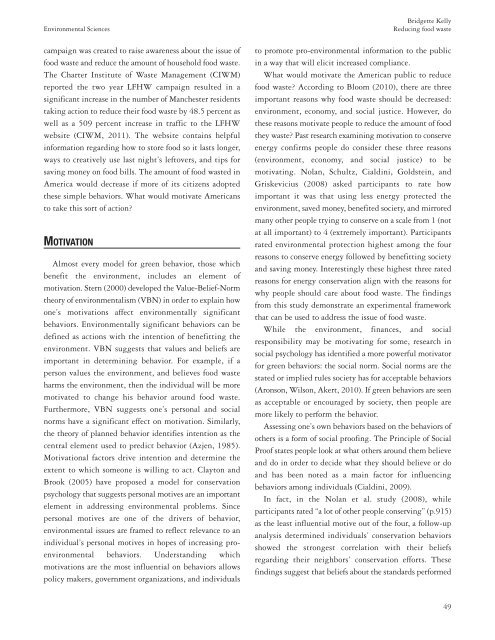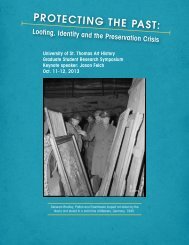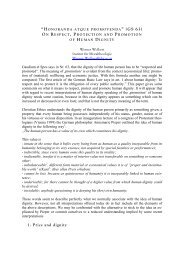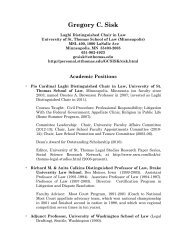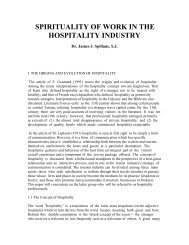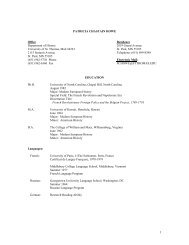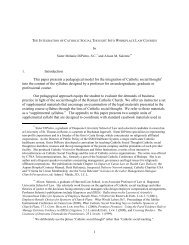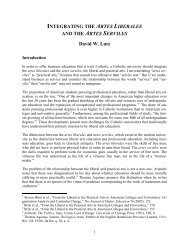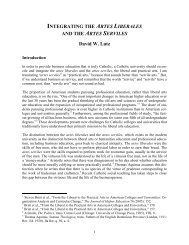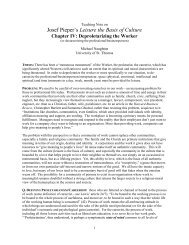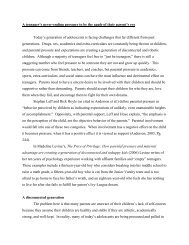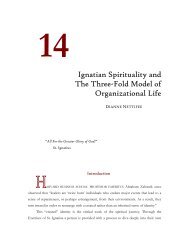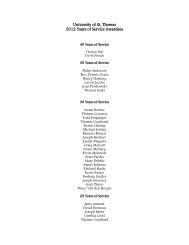dr. ronald e. mcnair acknowledgements - University of St. Thomas
dr. ronald e. mcnair acknowledgements - University of St. Thomas
dr. ronald e. mcnair acknowledgements - University of St. Thomas
You also want an ePaper? Increase the reach of your titles
YUMPU automatically turns print PDFs into web optimized ePapers that Google loves.
Bridgette Kelly<br />
Environmental Sciences Reducing food waste<br />
campaign was created to raise awareness about the issue <strong>of</strong><br />
food waste and reduce the amount <strong>of</strong> household food waste.<br />
The Charter Institute <strong>of</strong> Waste Management (CIWM)<br />
reported the two year LFHW campaign resulted in a<br />
significant increase in the number <strong>of</strong> Manchester residents<br />
taking action to reduce their food waste by 48.5 percent as<br />
well as a 509 percent increase in traffic to the LFHW<br />
website (CIWM, 2011). The website contains helpful<br />
information regarding how to store food so it lasts longer,<br />
ways to creatively use last night’s leftovers, and tips for<br />
saving money on food bills. The amount <strong>of</strong> food wasted in<br />
America would decrease if more <strong>of</strong> its citizens adopted<br />
these simple behaviors. What would motivate Americans<br />
to take this sort <strong>of</strong> action?<br />
MOTIVATION<br />
Almost every model for green behavior, those which<br />
benefit the environment, includes an element <strong>of</strong><br />
motivation. <strong>St</strong>ern (2000) developed the Value-Belief-Norm<br />
theory <strong>of</strong> environmentalism (VBN) in order to explain how<br />
one’s motivations affect environmentally significant<br />
behaviors. Environmentally significant behaviors can be<br />
defined as actions with the intention <strong>of</strong> benefitting the<br />
environment. VBN suggests that values and beliefs are<br />
important in determining behavior. For example, if a<br />
person values the environment, and believes food waste<br />
harms the environment, then the individual will be more<br />
motivated to change his behavior around food waste.<br />
Furthermore, VBN suggests one’s personal and social<br />
norms have a significant effect on motivation. Similarly,<br />
the theory <strong>of</strong> planned behavior identifies intention as the<br />
central element used to predict behavior (Azjen, 1985).<br />
Motivational factors <strong>dr</strong>ive intention and determine the<br />
extent to which someone is willing to act. Clayton and<br />
Brook (2005) have proposed a model for conservation<br />
psychology that suggests personal motives are an important<br />
element in ad<strong>dr</strong>essing environmental problems. Since<br />
personal motives are one <strong>of</strong> the <strong>dr</strong>ivers <strong>of</strong> behavior,<br />
environmental issues are framed to reflect relevance to an<br />
individual’s personal motives in hopes <strong>of</strong> increasing proenvironmental<br />
behaviors. Understanding which<br />
motivations are the most influential on behaviors allows<br />
policy makers, government organizations, and individuals<br />
to promote pro-environmental information to the public<br />
in a way that will elicit increased compliance.<br />
What would motivate the American public to reduce<br />
food waste? According to Bloom (2010), there are three<br />
important reasons why food waste should be decreased:<br />
environment, economy, and social justice. However, do<br />
these reasons motivate people to reduce the amount <strong>of</strong> food<br />
they waste? Past research examining motivation to conserve<br />
energy confirms people do consider these three reasons<br />
(environment, economy, and social justice) to be<br />
motivating. Nolan, Schultz, Cialdini, Goldstein, and<br />
Griskevicius (2008) asked participants to rate how<br />
important it was that using less energy protected the<br />
environment, saved money, benefited society, and mirrored<br />
many other people trying to conserve on a scale from 1 (not<br />
at all important) to 4 (extremely important). Participants<br />
rated environmental protection highest among the four<br />
reasons to conserve energy followed by benefitting society<br />
and saving money. Interestingly these highest three rated<br />
reasons for energy conservation align with the reasons for<br />
why people should care about food waste. The findings<br />
from this study demonstrate an experimental framework<br />
that can be used to ad<strong>dr</strong>ess the issue <strong>of</strong> food waste.<br />
While the environment, finances, and social<br />
responsibility may be motivating for some, research in<br />
social psychology has identified a more powerful motivator<br />
for green behaviors: the social norm. Social norms are the<br />
stated or implied rules society has for acceptable behaviors<br />
(Aronson, Wilson, Akert, 2010). If green behaviors are seen<br />
as acceptable or encouraged by society, then people are<br />
more likely to perform the behavior.<br />
Assessing one’s own behaviors based on the behaviors <strong>of</strong><br />
others is a form <strong>of</strong> social pro<strong>of</strong>ing. The Principle <strong>of</strong> Social<br />
Pro<strong>of</strong> states people look at what others around them believe<br />
and do in order to decide what they should believe or do<br />
and has been noted as a main factor for influencing<br />
behaviors among individuals (Cialdini, 2009).<br />
In fact, in the Nolan et al. study (2008), while<br />
participants rated “a lot <strong>of</strong> other people conserving” (p.915)<br />
as the least influential motive out <strong>of</strong> the four, a follow-up<br />
analysis determined individuals’ conservation behaviors<br />
showed the strongest correlation with their beliefs<br />
regarding their neighbors’ conservation efforts. These<br />
findings suggest that beliefs about the standards performed<br />
49


